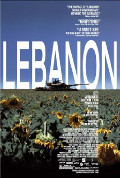
Directed by
Samuel Maoz
94 minutes
Rated MA
Reviewed by
Emma Flanagan

Lebanon
Synopsis: Four Israelis in their early 20s experience their first combat situation as tank troopers in the Israeli-Lebanese conflict of 1982. The tank is at once the protection from small arms fire as well as a sitting duck for larger weaponry.Lebanon is based on the screenwriter/director’s own experiences embodied here by his alter ego, the gunner Shmulik (Yoav Donat). Much of what we see is though Shmulik’s eyes as he looks through his gun’s scope and in turn, due to good cinematographic choices, as we cut back to the interior of the tank and to his face, what he thinks. Also impressive is the use of sound to heighten the drama of various moments, particularly the sound of the gun barrel shifting as the gunner scans for possible targets.
In the tank with the gunner are a nervous commander Assi (Itay Tiran) and two others. It is clear from the outset that Assi does not have the confidence of at least one of his charges and this leads to increasing friction which is exacerbated by the oppressive heat and the combat situation.
One evening the tank is called out to protect Jamil (Zohar Shtrauss) and his squad. Trouble arises when a vehicle driven by a suspected terrorist approaches; Shmulik is nervous, he freezes when given the command to fire, and then later when he does fire an innocent life is lost. As the night wears on, things go from bad to worse; the body is dumped into the tank because there is no other way to extract it from the hot zone; the tank commander starts to lose the plot, they end up in a Syrian occupied. And all the while, the tank’s confined space gets more and more humid, its inhabitants filthier and more scared.
There is plenty to be disturbed by. When ordered to fire upon a Christian residence, Shmulik faces the terrible dilemma of taking innocent lives in the course of following orders. This conflict of conscience is contrasted by the character of a Christian Phalangists who arrive later to guide the tank to safety and explains to a Syrian prisoner exactly how he is going to torture him before he kills him.
Lebanon has the claustrophobia of Das Boot (1981), but with an added layer - the tank is also a prison, rather like an oubliette, a medieval dungeon where the only way in or out is though a grate at the top. Indeed the medieval nature of the conflict is what is at the heart of Lebanon. It shows the absurdity and madness of war much like Apocalypse Now (1979) only with much greater economy and no doubt with added resonance for anyone with a direct relationship with the Arab-Israeli conflict,

Want more about this film?


Want something different?




